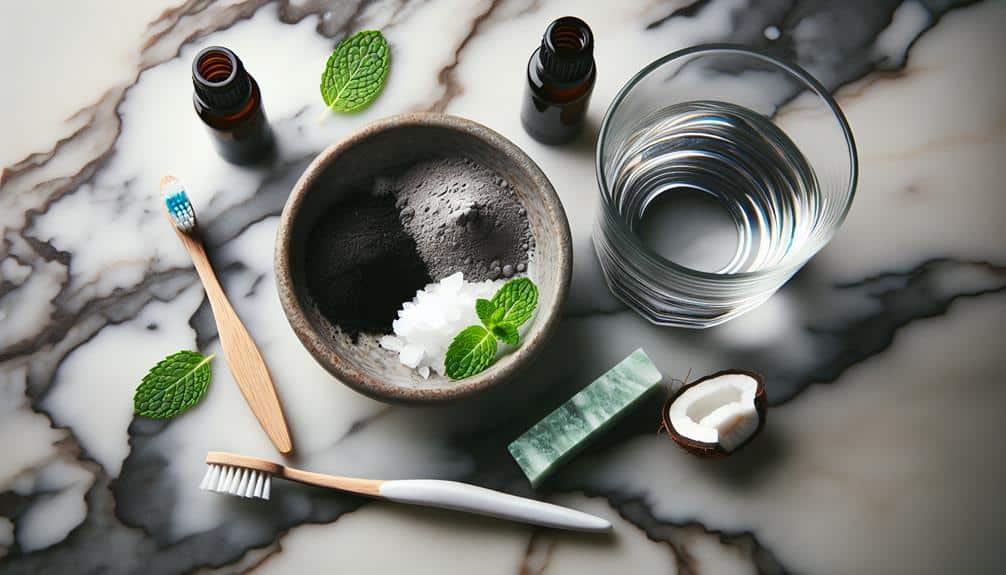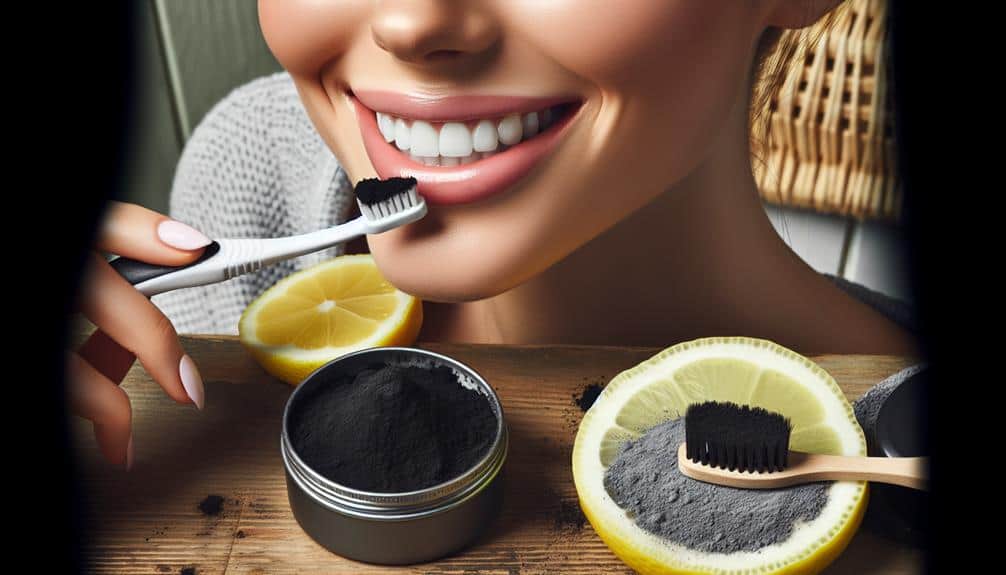To create the best Bentonite clay teeth whitening paste, start by combining Bentonite clay with baking soda for a gentle scrubbing action. Add coconut oil for its antimicrobial properties, hydrogen peroxide as a whitening agent, and peppermint essential oil for freshness. Apply this paste generously to your teeth, brushing gently in circular motions. Leave it on for 3-5 minutes before rinsing. For prime results, use this paste consistently 2-3 times a week, but remember that individual outcomes may vary. If you're looking to enhance your smile naturally, this DIY recipe may be just what you need.
Key Points
- Bentonite clay, baking soda, coconut oil, hydrogen peroxide, and mint oil are key ingredients.
- Mix clay and soda, add oil and mint, apply, and rinse for natural whitening.
- Ensure paste consistency, apply gently, leave on briefly, and rinse thoroughly.
- Use paste 2-3 times weekly for best results in teeth whitening.
- Monitor for sensitivity, use in moderation, and consult dentist if needed.
Benefits of Bentonite Clay Teeth Whitening
Using bentonite clay for teeth whitening offers a natural and gentle way to achieve a brighter smile without harsh chemicals. Bentonite clay, known for its ability to absorb toxins and impurities, can also help remove stains from the teeth. When used in oral health care, this clay acts as a mild abrasive, gently polishing the teeth to remove surface stains without eroding the enamel. Additionally, bentonite clay contains minerals like calcium and potassium, which can help strengthen teeth and promote overall oral health.
One of the primary benefits of using bentonite clay for teeth whitening is its natural composition. Unlike commercial whitening products that may contain harsh chemicals that can harm the teeth and gums, bentonite clay offers a safer alternative. This natural remedy not only helps whiten teeth but also supports oral health by balancing the mouth's pH levels and promoting healthy bacteria. By incorporating bentonite clay into your oral care routine, you can enjoy a brighter smile while also taking care of your overall oral health using natural remedies.
Ingredients for DIY Whitening Paste
To create a DIY whitening paste using bentonite clay, gather the following natural ingredients for a homemade remedy. Bentonite clay, the star ingredient, is renowned for its ability to absorb toxins and impurities. It aids in cleaning teeth and removing stains.
Baking soda, another key component, is mildly abrasive, helping to scrub away surface stains. Coconut oil, known for its antibacterial properties, promotes oral health and adds a revitalizing taste to the paste.
Hydrogen peroxide acts as a whitening agent, breaking down stains and brightening teeth. Peppermint essential oil not only freshens breath but also adds an invigorating flavor to the paste.
Step-by-Step Whitening Paste Recipe
For crafting your own effective whitening paste at home, gather the specified natural ingredients and follow this simple step-by-step recipe. Begin by combining 2 tablespoons of bentonite clay, known for its detoxifying properties, with 2 tablespoons of baking soda in a mixing bowl. Add 1 tablespoon of coconut oil, which has antimicrobial benefits, and mix until you achieve a smooth consistency. Next, add 10 drops of mint essential oil for a invigorating flavor and additional antibacterial properties.
Once your paste is well blended, use a clean toothbrush to apply a generous amount to your teeth. Gently brush in small circular motions for 2 minutes to allow the ingredients to work on removing stains and plaque effectively. After brushing, leave the paste on your teeth for another 3-5 minutes to maximize the whitening benefits. Finally, rinse thoroughly with water. This whitening paste recipe offers a natural alternative for achieving a brighter smile with easy application.
Tips for Using Bentonite Clay Paste
Maximize the effectiveness of your whitening routine with these practical tips for optimizing the benefits of Bentonite clay paste.
When applying Bentonite clay paste for teeth whitening, make sure you mix it to a smooth consistency to prevent clumps. Utilize a soft toothbrush to gently apply the paste in circular motions to cover all teeth surfaces thoroughly. Leave the paste on for about 1-2 minutes before rinsing with water. For optimal results, use the paste consistently, ideally 2-3 times a week.
Results from using Bentonite clay paste for teeth whitening can vary based on individual factors such as the initial tooth shade and the extent of staining. Generally, you may start noticing subtle improvements in the whiteness of your teeth after a few uses, but significant results typically become more apparent after 2-4 weeks of regular application. Remember that maintaining good oral hygiene practices alongside using Bentonite clay paste can further enhance the whitening effects.
Precautions and Potential Risks
Exercise caution when using Bentonite clay paste for teeth whitening as there are potential risks and precautions to be aware of. While Bentonite clay is generally considered safe for cosmetic use, there are potential side effects to take into account. Some individuals may experience dental sensitivity when using Bentonite clay paste, especially if they've sensitive teeth or gums. It's essential to monitor your teeth and gums for any signs of increased sensitivity or irritation when using this paste for whitening purposes.
To minimize the risk of potential side effects, it's recommended to use Bentonite clay paste in moderation and follow the instructions carefully. Avoid using the paste too frequently, as overuse may lead to increased dental sensitivity. Additionally, if you have a history of dental issues or sensitive teeth, it's advisable to consult with your dentist before incorporating Bentonite clay paste into your oral care routine.
Frequently Asked Questions
Can Bentonite Clay Teeth Whitening Paste Be Used on Sensitive Teeth?
If you have sensitive teeth, managing sensitivity while using bentonite clay teeth whitening paste is essential. Enjoy the benefits of natural whitening by applying the paste for shorter durations and avoiding vigorous brushing. Consider alternative applications and consult your dentist for personalized precautions.
How Long Does It Typically Take to See Results From Using a Bentonite Clay Teeth Whitening Paste?
To see results from using a bentonite clay teeth whitening paste, it typically takes a few weeks of consistent use. Applying it twice a week can yield noticeable whitening effects. This method is effective compared to other alternatives for natural teeth whitening.
Can Bentonite Clay Teeth Whitening Paste Be Used on Dental Restorations Like Crowns or Veneers?
When it comes to dental restoration compatibility, it's important to think about the impact of using bentonite clay teeth whitening paste. While some may be gentle enough, others might cause tooth sensitivity. Recommended brands can offer guidance.
Are There Any Specific Brands of Bentonite Clay That Are Recommended for Making Teeth Whitening Paste?
When making teeth whitening paste with bentonite clay, you may wonder about recommended brands. Look for reputable ones like Aztec Secret or Redmond Clay. Alternatively, consider using activated charcoal or coconut oil for added whitening benefits.
Can Bentonite Clay Teeth Whitening Paste Be Used as a Daily Toothpaste Replacement, or Should It Be Used Less Frequently?
For daily use, consider your dental sensitivity when using bentonite clay teeth whitening paste. While it can be a toothpaste replacement, some may find it too abrasive for frequent use. Monitor how your teeth respond.




